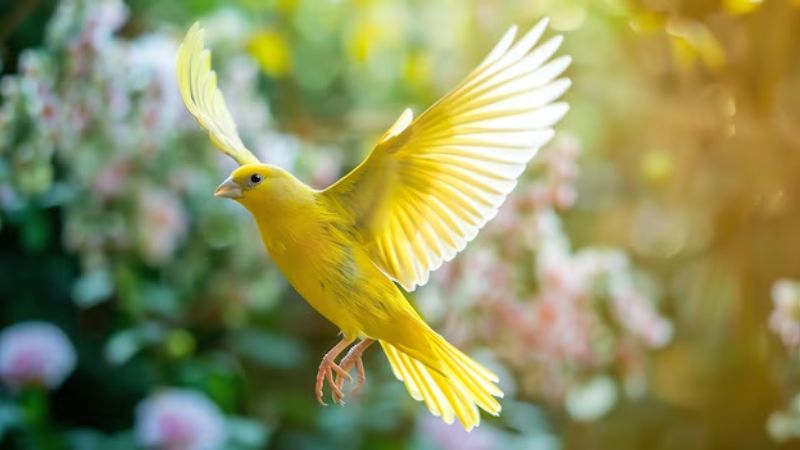Canary birds are beloved for their vibrant colors, melodic songs, and charming personalities. These little avian companions have captured the hearts of bird enthusiasts worldwide. If you’re considering bringing a canary into your home, one of the most important questions you may have is, “How long do canary birds live?” In this article, we‘ll explore the factors that influence a canary’s lifespan and share tips on how to ensure they live a long, healthy life.
How Long Do Canary Birds Live?
Under optimal conditions, domesticated canary birds can live anywhere from 10 to 15 years. However, some canaries have been known to live up to 20 years with exceptional care. In the wild, their lifespan tends to be shorter, averaging around 5 to 10 years, due to predators, disease, and environmental factors.
Factors Influencing Canary Lifespan
Species and Genetics
There are several breeds of canary birds, such as the Border Canary, Roller Canary, and Red Factor Canary. While most breeds have similar lifespans, genetic predispositions can influence an individual bird’s longevity. Birds from reputable breeders are less likely to inherit genetic issues that could shorten their lives.
Diet and Nutrition
A balanced diet is crucial for a canary’s health and longevity. In the wild, canaries feed on seeds, fruits, and small insects. Domesticated canaries thrive on:
- High-quality seed mixes tailored for canaries.
- Pellets that provide essential vitamins and minerals.
- Fresh fruits and vegetables, such as apples, spinach, and carrots (avoid avocado, as it is toxic to birds).
- Occasional protein sources, like boiled eggs or mealworms.
Environment and Cage Setup
Providing a safe and stimulating environment plays a significant role in extending your canary’s life. Consider the following:
- Cage Size: Choose a spacious cage that allows your bird to fly and move around freely.
- Perches: Use natural wood perches to prevent foot problems.
- Cleanliness: Regularly clean the cage to prevent bacterial or fungal infections.
- Temperature: Keep the environment stable, ideally between 65°F and 75°F (18°C and 24°C). Avoid drafts and direct sunlight.
Exercise and Mental Stimulation
Canaries need regular exercise to stay healthy. Encourage flight within their cage or provide supervised free-flight sessions in a bird-safe room. Toys, mirrors, and interaction with their owners can also prevent boredom and stress.
Healthcare
Routine health check-ups with an avian veterinarian can detect and address potential issues early. Look out for signs of illness, such as lethargy, changes in appetite, or unusual feather conditions. Common health issues in canaries include:
- Mites: External and internal mites can cause discomfort and health problems.
- Respiratory Issues: Often caused by poor air quality or infections.
- Egg Binding: A potentially life-threatening condition in female canaries.
Stress Management
Stress can significantly impact a canary’s lifespan. Minimize stress by maintaining a predictable routine, avoiding loud noises, and handling your bird gently.
How to Extend Your Canary’s Lifespan
To help your canary live a long and fulfilling life, follow these best practices:
- Provide a Nutritious Diet Ensure their diet is varied and rich in essential nutrients. Regularly rotate fruits and vegetables to keep meals interesting.
- Maintain a Clean Environment Clean the cage weekly and replace food and water daily to prevent contamination.
- Offer Regular Exercise Encourage movement by arranging perches and toys in a way that promotes activity.
- Monitor Health Closely Be vigilant for any signs of illness and seek veterinary care promptly if needed.
- Social Interaction Canaries are social creatures and enjoy interaction, whether it’s with other birds or their human companions. Spend time with your canary daily.
Signs of a Healthy Canary
A healthy canary will exhibit:
- Bright, alert eyes
- Smooth, vibrant feathers
- Energetic movements
- Regular, melodious singing (in males)
- Consistent eating and drinking habits
If you notice any deviations from these behaviors, consult an avian veterinarian.
Common Myths About Canary Lifespan
Myth 1: Canaries Only Live for a Few Years
While wild canaries may have shorter lifespans due to natural hazards, domesticated canaries can live well over a decade with proper care.
Myth 2: Singing Reduces a Canary’s Lifespan
Singing is a natural behavior for male canaries and does not shorten their lives. In fact, a singing canary is usually a sign of good health and happiness.
Myth 3: Canaries Don’t Need Vet Visits
Like any pet, canaries benefit from regular health check-ups to ensure they remain in optimal health.
Conclusion
Canary birds are delightful pets that can bring joy and music to your home for many years. By understanding their needs and providing exceptional care, you can ensure your canary lives a long and happy life. Remember, a commitment to their well-being is rewarded with their beautiful songs and companionship.
Whether you’re a seasoned bird owner or new to avian care, the key to a long-living canary is a combination of proper nutrition, a clean and stimulating environment, and regular health monitoring. Cherish your feathered friend, and they will brighten your days for years to come.
